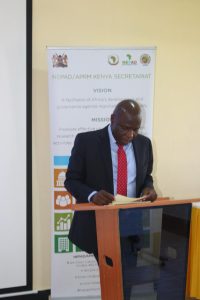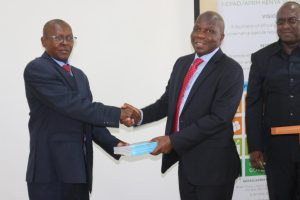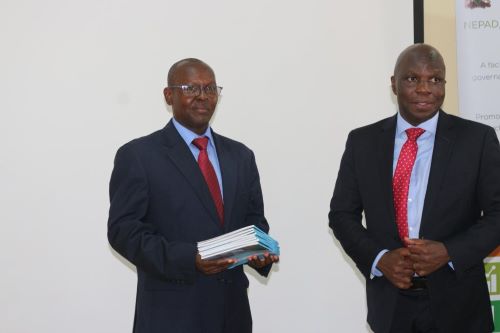National Governance Report Disseminated in Kajiado County
Economic Planning Principal Secretary James Muhati officiated the dissemination of the National Governance Report (NGR) in Kajiado County On 27th November, 2023. The report was prepared by NEPAD/APRM KENYA Secretariat with a view to monitor and report on all key aspects of governance, including tracking implementation of the African Union Agenda 2063 and the United Nations Sustainable Development Goals.
The dissemination exercise was meant to provide a platform for county stakeholders to be sensitized on the contents of the report, enable stakeholders to assess the outcome of their public participation contributions to the national governance reporting process and to understand their roles in the implementation of the recommendations.
The National Governance Report for Kenya was launched in September, 2023 at the Kenya School of Monetary Studies. It provided a comprehensive assessment of the country’s governance landscape. The data for the report was sourced from reviews of the governance literature, secondary data based on the NIMES- National Reporting Indicator Handbook, Key Informant Interviews and Focus Group Discussions (FGD).
PS Muhati explained that the overall Kenyan NGR index was based on the six APRM recommended Pillars: Rule of Law; Transparency and Accountability; Participation and Human Rights; Democracy, Elections and Freedoms; Peace and Security; and Socio-economic Governance.
“The key findings encompass various sectors, reflecting both positive developments and areas that require attention,” he observed.
The PS stated that the overall Kenyan NGR index score for the National Government’s self-assessment for Year 1 (2021) was 108.6% while that for Year 2 (2022) was 175.3%. He commended the fact that the performance was better during the second review year compared to the first.
“For example, the Participation and Human Rights pillar which assessed citizen Participation in Decision Making, Gender Equality in Leadership, Service Delivery, Non-State Actors in Policy Formulation and Decentralization was exceptional having risen from a commendable 138.4% score against targets in Year 1, to a 411.1% score against targets in Year 2.”, said Muhati adding that the Rule of Law pillar, on the other hand, reflected not only weak delivery of targets in general, but also a decline in attainment from 76.8% in Year 1 to 59.6% in Year 2.
Remarkably, Kenya was the first country to cascade the peer reviews governance approach to the sub-national level through the County Peer Review Mechanism (CPRM). This allowed county Governors to peer review each other while sharing best practices and also providing solutions to the identified challenges.
The six APRM NGR pillars were used to review county-level perceptions on the service delivery performances of the National Government and County Governments. Data was collected in 43 of Kenya’s 47 counties.
“The county residents’ perceptions of the combined National and County governments’ performances at the county level, was an overall performance index of 52.5%. On disaggregation, the National Government in the county scored 56.4%, outperforming the County Government which scored 48.6%,’ said PS Muhati.
He added that the National Governance Reporting and the County Peer Review Mechanism were critical enablers of the Bottom-Up Economic Transformation Agenda (BETA). The twin governance initiatives would assist in consistently and objectively tracking performance against core governance indicators critical to the economic transformation agenda.
Among those present during the function was the APRM/NEPAD Kenya Secretariat Chief Executive Officer, Amb. Dr. Samori A. Okwiya.







